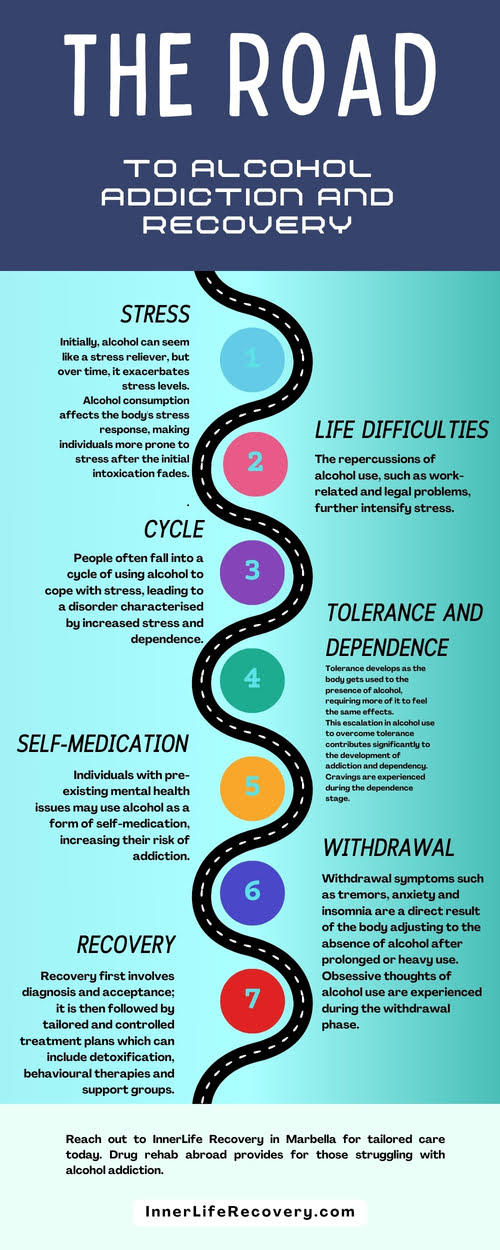Alcohol Addiction
What is alcohol?
Ethanol, the active component in alcoholic beverages, is responsible for the effects associated with alcohol consumption. While ethanol is the type of alcohol consumed in these recreational beverages, it’s important to distinguish it from other forms of alcohol that are toxic and not intended for consumption.
Regular and excessive indulgence in recreational alcohol can lead to a path of addiction. This addiction is a disruption of the brain’s reward circuitry, leading individuals to persistently seek the pleasure associated with alcohol consumption, regardless of the harm it may cause. Addiction and dependence, while related, are distinct issues, and in the case of alcohol, addiction often entails a physical dependency that compounds the difficulty of overcoming the habit.
Alcohol addiction is a global issue, affecting millions and resulting in a plethora of societal challenges, including healthcare burdens, loss of productivity, and strain on families and communities.
In this context, rehab centres like InnerLife Recovery in Marbella are important. Drug rehab abroad provides a sanctuary for those grappling with the complexities of alcohol addiction. Through a mix of medical expertise, psychological counselling, supportive therapies, and a new location, we offer a unique approach to addiction treatment.
Rehab in Spain is not just about treating the addiction but also about rediscovering one’s identity and purpose beyond it. At InnerLife Recovery, we focus on rebuilding relationships, redefining personal goals, and learning new coping mechanisms that support a healthier, more fulfilling life.

Get in touch
Start your journey today by contacting us to speak with one of our knowledgeable advisors for a FREE confidential assessment.
Whether you’re reaching out for yourself or a loved one, we’re here to provide the support and guidance you need, whenever you need it.
Is alcohol addiction the same as alcohol dependence?
The understanding of problematic alcohol consumption has evolved significantly over time. Initially, the term “alcohol abuse” was used to describe a particular set of drinking behaviours that were considered harmful.
However, this term has since expanded to cover a wide range of unhealthy drinking patterns. These patterns encompass various forms of excessive alcohol use, such as binge drinking, which involves consuming large quantities of alcohol in a short period, and reaching levels of intoxication that pose significant health risks. Additionally, the term now includes the broader concepts of alcohol addiction and dependence outside of clinical settings.
Alcohol addiction is a complex condition marked by a compulsive need to consume alcohol despite the negative consequences it may bring. It’s characterised by an overwhelming desire to drink, loss of control over alcohol intake, and continued use despite adverse outcomes.
On the other hand, alcohol dependence, a term with a more precise definition, refers to a physical or psychological reliance on alcohol. This dependence develops when an individual’s prolonged and heavy alcohol use leads to the brain and body adapting to the presence of alcohol. In such cases, maintaining certain levels of alcohol becomes necessary for the individual’s perceived normal functioning.
When someone with alcohol dependence attempts to reduce or stop their alcohol intake abruptly, they often experience withdrawal symptoms. These symptoms can range from mild discomfort to severe, life-threatening conditions and are indicative of the body’s physical adaptation to the presence of alcohol. The nature and severity of these symptoms vary based on the duration and intensity of the individual’s drinking habits.
Am I an alcoholic?

Firstly, the colloquial term “alcoholism” is broadly used. It encapsulates the idea of ongoing alcohol consumption that progressively leads to both physical and psychological harm. Alcoholism, in its core essence, signifies an uncontrollable urge to consume alcohol, regardless of the negative consequences it brings. This term is the same as alcohol addiction, as it vividly portrays the compulsive nature of the condition.
Another term, “alcohol dependence syndrome,” finds its roots in the World Health Organization’s International Classification of Diseases. This designation paints a picture of a chronic, overwhelming craving for alcoholic beverages, coupled with a lack of control over drinking habits. Individuals with alcohol dependence syndrome exhibit a harmful pattern of alcohol use that severely hampers their ability to function in social or occupational settings. The development of this syndrome is influenced by a confluence of genetic, psychological, and environmental factors, highlighting the complexity of its origins.
The third term, “Alcohol Use Disorder” (AUD), represents a more recent conceptualization of the problem. Introduced by the American Psychiatric Association in the DSM-5 in 2013, AUD consolidates the concepts of alcohol dependence and abuse. This categorization is more comprehensive, recognizing a spectrum of 11 symptoms associated with problematic alcohol use. The presence of at least two of these symptoms qualifies for a diagnosis of AUD, which is further differentiated into mild, moderate, or severe, based on the number and intensity of symptoms exhibited.
Is everyone susceptible to alcohol addiction?
In short, no. Here are a list of risk factors which means that some individuals are more at risk to addiction than others:
Genetics
There is a strong genetic component to alcohol addiction. Individuals with a family history of alcoholism are at a higher risk, pointing to a hereditary aspect. Certain genes related to how alcohol is metabolised and brain functioning might increase this risk.
Brain chemistry
Alcohol consumption impacts key neurotransmitters in the brain, like dopamine and serotonin, which regulate pleasure and mood. Chronic use of alcohol can modify the brain’s chemical balance, leading to a greater propensity for dependence.
Influence of social factors
The environment, including family dynamics, peer influence, and cultural attitudes towards drinking, plays a crucial role in the development of alcohol addiction. Regular exposure to environments that condone or encourage heavy drinking, or experiencing stressful situations, can heighten the risk of alcohol misuse.
Impact of early drinking
Starting to drink alcohol at a young age can increase the likelihood of addiction. Early exposure can interfere with brain development and escalate the risk of dependency in later life.
Personality traits
Certain personality characteristics, such as a tendency towards impulsiveness, risk-taking, and seeking new sensations, are linked to a higher risk of developing alcohol addiction. People with these traits may be more inclined to engage in hazardous drinking practices.
Changes in neurology
Alcohol’s effect on the brain’s reward system can lead to alterations in neural pathways. Over time, the brain might start relying on alcohol to trigger the release of pleasure-associated neurotransmitters.
Development of physical dependence
Continuous and excessive alcohol consumption can lead to physical dependence. The body adjusts to the presence of alcohol, and withdrawal symptoms may emerge when attempting to reduce or stop consumption, complicating efforts to overcome addiction.
Varied individual experiences
It’s vital to recognize that not everyone who consumes alcohol will develop an addiction. The interplay and impact of these contributing factors differ from one individual to another.
For those struggling with alcohol addiction, it’s essential to seek professional assistance. A tailored and holistic approach to recovery is crucial for effective treatment.
Why do people become addicted to alcohol?
History
The inclination towards alcohol dates back to ancient times, with its intoxicating effects being a significant draw. Alcohol’s role in elevating mood, inducing a sense of euphoria, reducing anxiety, and enhancing social interactions has made it a longstanding element in various cultural and personal settings.
Culture
Throughout history, alcohol has been integral to numerous cultural rituals and ceremonies, embedding itself deeply in various traditions and rites of passage.
Escape
Beyond its positive aspects, alcohol often serves as a means for individuals to escape from life’s challenges. It is used to cope with stress, mental health issues, chronic pain, or the mundaneness of daily life.
Coping
For some, alcohol acts as a dual-sided tool that provides temporary relief or joy but also serves as an escape from reality. This use of alcohol as a coping mechanism can have both immediate and long-term implications.
Evolution from casual to addiction
Casual drinking can gradually evolve into addiction for a certain group of individuals. The transition from occasional use to addiction involves the development of intense cravings or psychological dependencies, leading to a harmful pattern of uncontrolled alcohol consumption.
Cycle
Once addiction sets in, individuals often find themselves caught in a relentless cycle of needing to drink. This cycle is characterised by an overpowering compulsion to consume alcohol, trapping the individual in a pattern of dependence and consumption that can be difficult to break.

Why Choose Us?
Alcoholism signs and symptoms
| Physical symptoms of alcohol addiction | Behavioural symptoms of alcohol addiction |
|---|---|
| Withdrawal symptoms | Loss of self-contro |
| Increased tolerance | Obsession with drinking |
| Liver damage (e.g., cirrhosis) | Ignoring responsibilities |
| Weakened immune system | Denial |
| Gastrointestinal problems | Drinking in risky situations |
| Pancreatitis | Continued use despite bad consequences |
| Tolerance to alcohol | Alcohol cravings |
| Cardiovascular problems | Isolation |
| Neurological issues (e.g., neuropathy) | Unsuccessful attempts to quit |
| Gastritis | Loss of general interest |
| Sexual dysfunction | Legal and financial issues |
What is the road to addiction and recovery?
Addiction journeys are highly individualised, with each person’s path being shaped by specific motivations and experiences. This diversity necessitates varied psychotherapeutic approaches in treatment, tailored to each patient’s unique needs.
- Alcohol consumption affects the body’s stress response, making individuals more prone to stress after the initial intoxication fades.
- Stress: Initially, alcohol can seem like a stress reliever, but over time, it exacerbates stress levels.
- Life difficulties: The repercussions of alcohol use, such as work-related and legal problems, further intensify stress.
- Cycle: People often fall into a cycle of using alcohol to cope with stress, leading to a disorder characterised by increased stress and dependence.
- Tolerance: Tolerance develops as the body gets used to the presence of alcohol, requiring more of it to feel the same effects.
- Dependence: This escalation in alcohol use to overcome tolerance contributes significantly to the development of addiction and dependency.
- Alcohol’s impact on mental health: Alcohol use can cause neurological harm and contribute to the onset of mental health disorders.
- Self-medication: Individuals with pre-existing mental health issues may use alcohol as a form of self-medication, increasing their risk of addiction.
- Dual-diagnosis: Recognizing and treating co-occurring mental health issues alongside addiction is vital for effective rehabilitation and recovery.

Treatment
Addiction treatment must be customised to address the unique psychological factors contributing to each individual’s addiction.
Effective treatment strategies should include managing stress and any co-occurring mental health disorders.
Treatment plans need to tackle issues of tolerance and dependence, aiming to reduce and eventually eliminate the need for alcohol.
Successful addiction treatment should consider all aspects of an individual’s life and health, to provide comprehensive care and support towards recovery.
Alcohol withdrawal symptoms
Alcohol withdrawal symptoms can vary in severity and are a direct result of the body adjusting to the absence of alcohol after prolonged or heavy use. Here’s a list of common alcohol withdrawal symptoms along with explanations:
1. Tremors: Often one of the first signs of withdrawal, tremors or “the shakes” typically start within hours after the last drink. They are involuntary shaking movements, especially noticeable in the hands.
2. Anxiety: Withdrawal can lead to heightened feelings of nervousness, worry, and panic. Anxiety during withdrawal is a response to the body’s stress system overcompensating for the absence of alcohol.
3. Insomnia: Difficulty falling asleep or staying asleep is common. Alcohol affects brain chemistry and sleep patterns, so when it’s removed, the body struggles to regulate sleep naturally.
4. Sweating: Excessive sweating, particularly at night, can occur. This is part of the body’s natural response to detoxification as it adjusts to functioning without alcohol.
5. Headache: Headaches are common and can range from mild to severe. They result from the body’s adjustment to the absence of alcohol, as well as potential dehydration and changes in blood pressure.
6. Nausea and vomiting: These symptoms are part of the body’s way of expelling toxins. They can also be a reaction to the increased acidity in the stomach that often accompanies withdrawal.
7. Increased heart rate: Also known as tachycardia, this symptom involves a faster than normal heartbeat. It’s a response to the body’s increased stress levels and the need to maintain normal bodily functions without alcohol.
8. Hallucinations: In more severe cases, individuals may experience visual, auditory, or tactile hallucinations. This is a result of significant alterations in brain chemistry due to the absence of alcohol.
9. Seizures: Seizures are among the more serious symptoms of withdrawal and can occur in individuals who have been drinking heavily for a long period. They result from the brain’s electrical activity becoming more active without the depressive effect of alcohol.
10. Delirium tremens (DTs): This is a severe form of alcohol withdrawal, characterised by confusion, rapid heartbeat, and fever. DTs can be life-threatening and require immediate medical attention.
It’s important to note that alcohol withdrawal can be dangerous and should be managed under medical supervision, especially for those with a history of heavy and prolonged alcohol use. Medical professionals can provide the necessary support and treatment to safely manage these symptoms.
How does alcohol addiction make my life worse?
Mental health
Alcohol addiction is often associated with mental health issues like depression and anxiety:
- It can worsen existing mental health conditions or trigger new psychiatric problems.
- There’s an elevated risk of suicidal behavior linked to chronic alcohol abuse.
Heart health concerns
- Regular alcohol use can interfere with the heart’s electrical activity, causing arrhythmias.
- Long-term abuse heightens the risk of atrial fibrillation and other heart diseases.
Liver damage
- Excessive alcohol consumption is a primary cause of liver cirrhosis, which involves liver tissue scarring.
- Advanced cirrhosis can lead to liver failure, a serious health risk.
Risks to pregnancy
- Alcohol consumption during pregnancy can harm the foetus, leading to Foetal Alcohol Spectrum Disorder (FASD).
- FASD encompasses a range of developmental issues affecting a child’s physical, cognitive, and behavioural capabilities.
Accident risk
- Alcohol impairs coordination and judgement, raising the likelihood of accidents and injuries.
- This includes immediate risks like falls or car accidents, as well as long-term hazardous behaviour patterns.
Further information
Risks of mixing alcohol with drugs
- Alcohol use with other drugs heightens the risk of harmful interactions.
- Enhances sedative effects of certain drugs, including opioids and antipsychotics.
- Combining with cocaine creates toxic by-products; with cannabis, it increases THC effects.
- Interactions may occur with some antibiotics.
Teen alcohol abuse
- Despite age restrictions, alcohol misuse is common in teenagers.
- Influences include trauma, mental health issues, peer pressure, and environment.
- A minority develop serious alcohol use disorders.
Alcohol during pregnancy
- Drinking in pregnancy can cause foetal alcohol spectrum disorders (FASDs).
- Risks include low birth weight, developmental delays, and distinctive facial features.
- Foetal alcohol syndrome (FAS) is a severe form of FASD.
Older adults and addiction
- Alcohol addiction in the elderly is often overlooked.
- Influenced by health conditions, medication interactions, and life changes.
- Increases risks of falls, accidents, and exacerbates health issues.
Diagnosing alcohol addiction
- Diagnosis involves assessing tolerance, withdrawal symptoms, and impact on life.
- Reluctance to admit drinking problems complicates diagnosis.
Treatment approaches
- Detox: Removing alcohol from the body, supervised due to withdrawal risks.
- Medications: Disulfiram, naltrexone, acamprosate, and baclofen aid in treatment.
- Behavioural therapies: Includes CBT, MET, CM, and DBT for changing behaviours and managing emotions.
- Therapy and counselling: Addresses underlying causes and develops coping strategies.
- Support groups: Groups like AA provide communal support.
- Program types: Inpatient for intensive care, outpatient for flexible treatment.
- Aftercare: Continuous support through counselling and groups post-treatment.
FAQs
Contact Us
Contact us today to learn more about our comprehensive treatments, counselling, and support offerings. Reclaim your Inner Life and embrace a brighter future with InnerLife Recovery.






